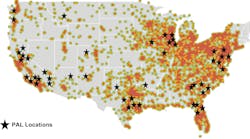But long-distance phone companies may not pass their payphone savings on to customers
The good news: the Federal Communications Commission (FCC) has finally finished taking another look at how much long-distance phone companies should compensate the owners of payphones for calls to toll-free numbers, and the Commission decided the rate should be 24 cents per call, not 28.4 cents.
In a January 28 order, the five-member Commission showed rare unanimity in agreeing on the new "default" rate, which will now apply to all "dial-around" calls for which the long-distance carrier (IXC in FCC-speak) and payphone owner have not previously agreed on a compensation rate. "Dial-around" calls include calls to either a subscriber's toll-free number or a long-distance company's "10-10-xxx" or "1-8xx" type number.
Sweeter yet, the FCC decided the 24 cents rate should be retroactive to October 7, 1997, the day it adopted the 28.4 cents rate that caught the trucking industry and other heavy users of dial-around services by surprise.
In response to an order from the U.S. Court of Appeals, the FCC recalculated the rate, based on more up-to-date information and a "bottom up" methodology rather than its previous method of knocking 6.6 cents off the typical coin-call rate. Both a commissioner and a lawyer who fought the FCC over its earlier order tell me they think this order is much better reasoned and more likely to withstand court challenge. And Congress shows no inclination to step in.
But don't plan a party to celebrate your savings just yet. First, IXCs still owe payphone owners for dial-around calls from an earlier period; those payments may eat up all of the refunds.
Second, even on a going-forward basis, phone companies don't have to share the goodies with their customers. Under the increasingly deregulated world of the Telecommunications Act of 1996, the FCC's jurisdiction in this area covers relations within the telephone industry, not with customers.
The Commission's order offers this faint solace: "Although we do not require IXCs to pay refunds to their customers, we believe that doing so would serve the public interest. We encourage IXCs to issue refunds to their customers and to notify their customers of these refunds. We also encourage IXCs to publicly disclose the manner in which they utilize their refunds" from payphone owners.
Fleet operators who recall the late, not-so-great days of the Interstate Commerce Commission (ICC) may be reminded of those fuel surcharges that carriers would beg the ICC for whenever their diesel suppliers hiked prices. Even when the ICC allowed carriers to put surcharges on their tariffs, it would do nothing to order truckers and customers to adopt a particular surcharge rate or formula. Similarly, IXCs may have to pay their "suppliers" of payphone calls a default compensation rate if they haven't negotiated one, but the FCC won't tell the IXCs how, or how much, to pass that rate on to phone users.
When the default rate was 28.4 cents, most IXCs eventually charged their subscribers 30 cents per call, supposedly to recover the bookkeeping expense of tracking how much each payphone owner was entitled to each month. It will be interesting to see if IXCs are able to hang on to a 30 cents rate, much as trucking companies try to keep a fuel surcharge in place even after a diesel price spike turns around.
Increasingly, truckers are able to "dial around" payphones altogether. Cellular and other wireless alternatives are proliferating and rates are generally coming down. In fact, the old single-rate, anytime long-distance pricing known as WATS seems to have been reincarnated in the cellular calling plans that abolish the distinction between long-distance and local calls.
The bottom line: Now more than ever it may pay to shop around. The FCC has set a default rate it says it wants to keep in place at least through January 2001, and the courts and Congress appear likely to go along. Thus, IXCs may be more likely to cut deals with both payphone owners and customers. Truckstops, payphone providers, and other vendors may also offer more alternatives to fleets. And more and more wireless companies are sure to offer land- and space-based options at increasingly competitive rates.


